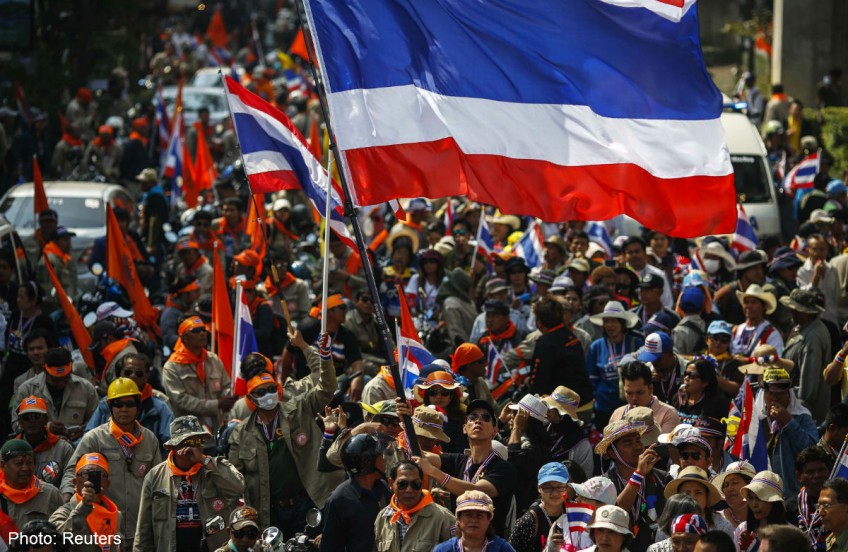Thai central bank warns of substantial risk from prolonged unrest

Protesters have been trying to topple Prime Minister Yingluck Shinawatra since November, prompting the government to announce a state of emergency ahead of Sunday's vote that was boycotted by the main opposition party.
The ballot and the emergency order are being challenged in the courts and there is no indication of how, or even if, an election winner can be announced.
The Bank of Thailand's monetary policy committee (MPC) warned of the effect of a prolonged crisis on Southeast Asia's second-largest economy, which is heavily reliant on tourism.
The stock market has fallen more than 10 per cent since the start of November.
"The committee agreed that the downside risks to growth have increased substantially," the panel said, according to the minutes of a Jan. 22 meeting published on Wednesday.
"Growth impact could be more pronounced if a prolonged unrest were to cause a switch of export orders to other countries, with a potential knock-on effects on domestic spending," it said.
The standoff, with bursts of violence in which 10 people have been killed, is the latest round of an eight-year dispute between Bangkok's middle class, southern Thais and the royalist establishment against the mostly poor, rural supporters of Yingluck and her brother, former prime minister Thaksin Shinawatra. Thaksin was ousted by the military in 2006.
Tourism is taking a hit, infrastructure spending has stalled and investors and consumers are uneasy.
At the Jan. 22 meeting, the committee slashed its economic growth forecast for this year to around 3 per cent from about 4 per cent. A week later, central bank Governor Prasarn Trairatvorakul said growth could be even lower than 3 per cent because the unrest had affected consumption and investment.
Economic data released since the MPC meeting show continuing weakness. Factory output in December fell 6.1 per cent from a year earlier, and while exports that month were up 1.9 per cent on an annual basis, central bank indexes for consumption and investment kept falling.
ALLEGATIONS OF CORRUPTION
Pressure on the government mounted on Tuesday, when a flagship rice-buying scheme vital to its support stumbled closer to collapse and the opposition filed legal challenges that could void the weekend election.
The rice scheme helped sweep Yingluck to power in 2011 but is now steeped in allegations of corruption, while growing losses are making it increasingly hard to fund.
Political crises have not always been a drag on Thailand's economy despite governments being toppled, protesters shot, buildings set ablaze, and airports and shopping malls seized by demonstrators over the past eight years.
Each time, Thailand's financial markets bounced back. "The Thai economy has withstood the political rupture since 2006, and other shocks including large-scale flooding in late 2011," Fitch Ratings said.
GDP growth had averaged 2.9 per cent between 2008 and 2013, slightly higher than the average of 2.6 per cent in comparable countries, it said.
"Nonetheless, Fitch thinks political tensions are already weighing on economic activity - evident from a contraction in manufacturing output of around 7 per cent year-on-year in the fourth quarter of 2013."
The anti-government demonstrators, mostly from Bangkok and the south, say Yingluck is Thaksin's puppet and the costly giveaways that won his parties every election since 2001 are tantamount to vote-buying using taxpayers' money.
They say Thaksin's new political order is tainted by graft and cronyism and want an appointed "people's council" to replace Yingluck and overhaul a political system hijacked by her brother, who lives in exile to avoid a jail term for graft.
It was not all bad news for Yingluck.
The election, if not annulled by the courts, is almost certain to renew her mandate, although it is unclear when re-runs of disrupted votes will be held.
And the number of protesters on the streets has dwindled since the election, allowing at least three government ministries to resume work at their usual offices this week.
"We will slowly start to open government offices but some state employees will have to keep working from back-up locations," police spokesman Piya Utayo said.
"Not a single government office has had to stop working but since these protests began they have had to change location."
[[nid:80784]]